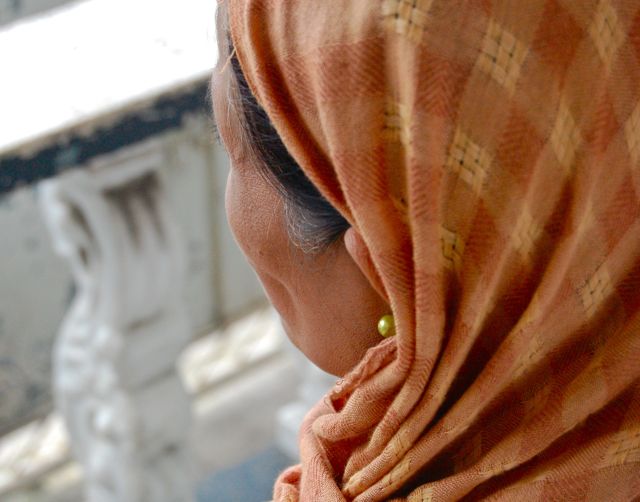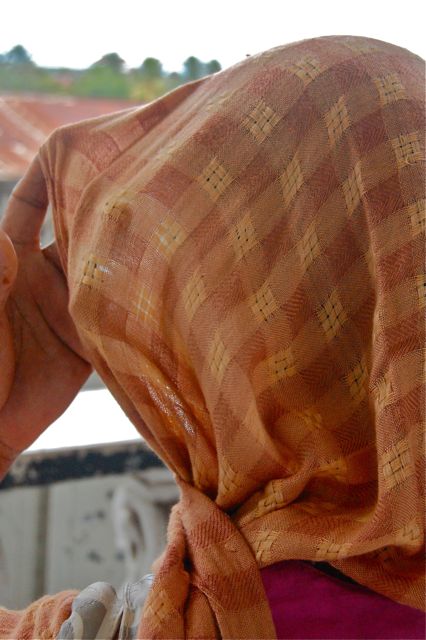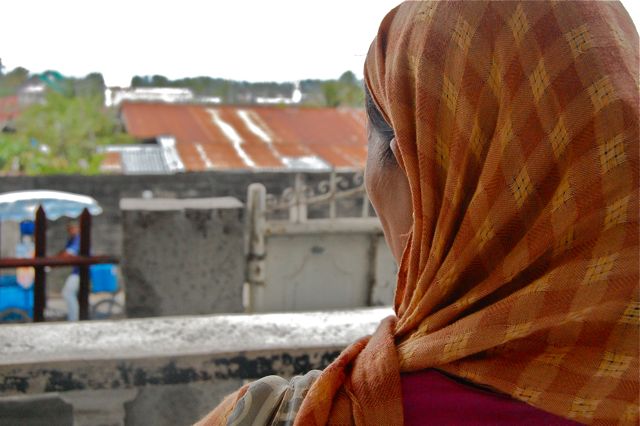(In January 2011, and thanks to the ICRC Young Reporter Competition, I had the fortune of visiting the ICRC mission in the Philippines to report on the situation of youth. This post is part of a series I wrote on this visit. Click here to see the rest of the posts.)
I am very bad at quick decision-making. I am one of those who always ask for more time in the restaurant just to be able to choose a drink. I stand in silence in the middle of the cheese aisle wondering what adventurous choice I’ll make this week.
I’m a slow decision-maker. Not good, not bad… Slow.
But on Friday the 4th of February 2011, at around 1 PM PHT, I immediately knew that that was it. In a trip full of learning experiences, there was one I could easily choose if I could only remember fifteen minutes from the entire trip.
If I were a journalist, I wouldn’t rest before a feature on her story was picked up by a big newspaper. But I’m just a random human with Internet access, so I will only blog about it, hoping that I can still do this experience justice.
This woman here? She’s much younger than my mother; slightly older than my partner. She is a mother of two, the wife of a man who is in prison because of the conflict, a hard worker. She also lives in poverty, and is a grateful beneficiary of an ICRC program that allows her to visit her husband in prison (they are in different areas of the country). You can find all the important details in my article.
That Friday afternoon, I was on what I call optimism high. I had earlier been to a forum with really cool teenagers who are working to end the conflict in Mindanao, running huge projects at age 16. We had just arrived back in Cotabato City to sit in a room with the truly honorable Bai Fatima and two beneficiaries of the family visit program. They didn’t speak English, so the outstanding ICRC worker who accompanied me throughout my stay interpreted for me.
You know, Mexico really ain’t an episode of Friends. I have seen poverty. I have seen natural disasters pull towns apart. I’ve seen the injustices perpetrated against many because they dared to speak, or because they didn’t speak Spanish. Everyday, all the moral theories in my mind crumble into bits when I realize I brought no apples to share, and there is a pack of street children begging for money. My existence has been sheltered, but not that sheltered.
But sitting in that room, at a 30ºC+ temperature in humid Mindanao, I felt cold.
Her story, both in her and my eyes (I can assure you this is not a case of poverty porn), is a story of pain and difficulties.
The outstanding ICRC worker and I asked most of the questions. Bai Fatima, who knew her personally, added a question or two at times, and her reactions of surprise. In proper journalistic manner, we recorded everything that was said. I haven’t been able to get myself to listen to the recording since the day I finished writing my article.
She told us about the reasons for her husband’s imprisonment, the current legal process, her contact with him. Every time I now look at my loathed Nokia brick, I remember how much an artifact like that has improved things for this woman and her husband.
All of this came with technical details that were expected, given the type of interview this was, and that I had already mentally prepared for. But then there were the things I was not prepared for, and that I don’t think I possibly could have been.
She told us, upon our question, about her income. She told us that hours’, if not days’, worth of work pay her under 50 USD cents. And, months after this happened, I cannot find a way to describe what I felt just then, sitting in a room with someone who could eat for six months with what I had in my pocket.
How can aid workers witness this everyday and keep living with their own minds? I missed the following minute of the interview (thank you recorder) as I tried to make sense of all the dilemmas fluttering into my mind. Can I just give her the money? Is it actually worse, morally speaking, to do so? Shouldn’t I be ashamed to be making this about myself, rather than about her?
That’s what it was, I think. It stopped being just about her story. I couldn’t keep listening with this scientifically virtuous neutrality, objectivity, that may not exist but that you still need to recreate. It started involving empathy, and yes – guilt.
But that’s not the only thing that makes this experience so complex in my mind. To add to the cultural, emotional baggage, her perception of her own pain has little to do with the fact that she lives in poverty.
She feels her daughters’ frustration at their limited possibilities to visit him. She said that the only thing that she wants to see is her family reunited. It is the separation that causes her pain; not the fact that this separation has led them to a more economically vulnerable position.
And so there I was, sitting with enough money for this woman’s expenses for a few months, wondering how to deal psychologically with this fact… And then I realize that it is not about the poverty. It is about the broken relationships. It is about the complex situations of conflict about which we all make big assumptions, but, in the end, know very little about.
Every time I think about this day, I come up with a different angle for its analysis. I learn more about myself. I realize that we are indeed closer to asking the right questions, rather than to providing the right answer.
It was during events like this, meetings with beneficiaries, that I had to take a personal stance on the ‘should we pay for aid?’ debate. But that’s a topic for another post. I just wanted to write about the moment that I really wish everyone could have witnessed.
Photo credits: © ICRC/García Montes, Mariel
The here shown material has been produced with the authorization of The International Committee of the Red Cross (ICRC). However, it does not necessarily reflect the ICRC’s views, and the ICRC may not be held liable for any content here shown”.



